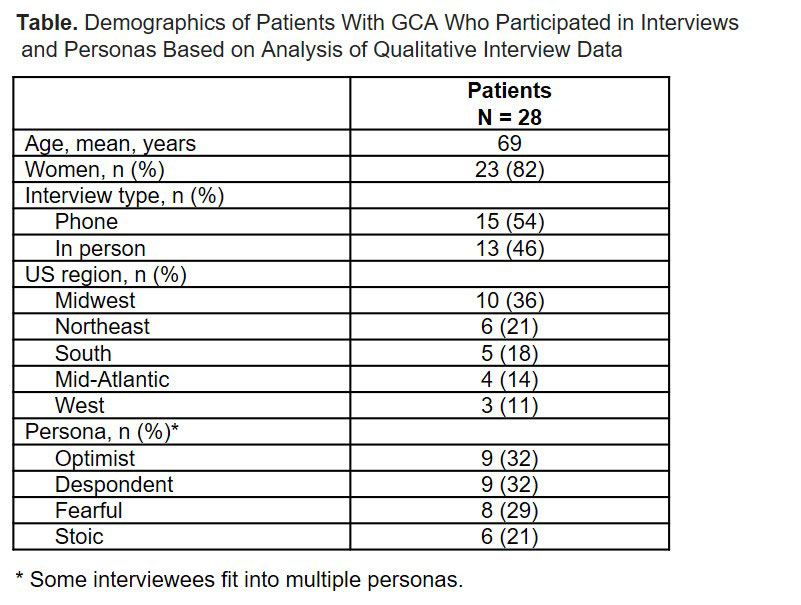Session Information
Date: Tuesday, November 12, 2019
Title: Patient Outcomes, Preferences, & Attitudes Poster II: Patient Preferences, Beliefs, & Experiences
Session Type: Poster Session (Tuesday)
Session Time: 9:00AM-11:00AM
Background/Purpose: Diagnosis of giant cell arteritis (GCA) is difficult due to multiple presenting symptoms, and access to care may be delayed because often multiple providers are involved in the diagnosis of GCA and disease management. Treatment with high-dose glucocorticoids (GCs) can relieve symptoms and prevent vision loss, but GC-related adverse events are common; GCA often relapses once GCs are tapered. The purpose of this study was to understand the GCA patient care pathway and unmet needs in GCA through in-depth patient interviews.
Methods: US patients with GCA were recruited through outreach to physicians and The Vasculitis Foundation. Extensive individual interviews with patients were conducted by qualitative researchers by phone or in person and explored patients’ perspectives and experiences from the onset of GCA symptoms to diagnosis and disease management. The qualitative data collected were analyzed using human-centered design methodology, including patient typologies (personas: optimist, fearful, stoic or despondent), forced temporal zoom (journey maps), forced semantic zoom (stakeholder system mapping) and affinity mapping for pattern recognition of unmet needs.
Results: A total of 28 patients were interviewed; 23 (82%) were women and mean age was 69 years (Table). The number of patients in each persona category is shown in the Table. Stoic and optimist personas had medium to high levels of self-advocacy and a positive/engaged attitude about their condition, while fearful and despondent personas had low levels of self-advocacy with disengaged/negative attitudes toward their condition. Patients often ascribed their milder GCA symptoms to causes such as stress and did not consult a physician until they developed moderate to severe symptoms. After diagnosis of GCA, all patients received GCs with little information on the chronicity of GCA or treatment alternatives to GCs. Overall, patients managed their GCA independently, and sought to balance relief of GCA symptoms with the adverse effects of GCs. Patients concentrated on tapering and discontinuing GCs, with less concern about relapse. Furthermore, patients who were most uncomfortable with the adverse effects of GCs often waited until their GCA symptoms became debilitating before telling their physician. Almost all patients reported searching for a support group after the diagnosis.
Conclusion: Patients with GCA experience adverse effects from GCs and want a clearer understanding of treatment options; they remain focused on reducing their GC dose and need access to support groups. For those with inflammatory comorbidities, GCA diagnosis is another burden in a debilitating journey resulitng in a sense of disempowerment and resignation toward their condition and limited treatment options. Patients’ attitudes and self-advocacy vary depending on their personas; recognizing these personas may help HCPs coordinate patient care. Increased awareness of GCA among patients and HCPs may accelerate the path to diagnosis and treatment, and emerging therapies may help reduce GC burden.
Acknowledgements: This study was funded by Genentech, Inc. Support for third-party writing assistance, furnished by Health Interactions, Inc, was provided by Genentech, Inc.
To cite this abstract in AMA style:
Best J, Nunez I, Woodburn K, Breyer A, Conway M, Michalska M. Patients’ Journeys Through Giant Cell Arteritis: A Qualitative Study [abstract]. Arthritis Rheumatol. 2019; 71 (suppl 10). https://acrabstracts.org/abstract/patients-journeys-through-giant-cell-arteritis-a-qualitative-study/. Accessed .« Back to 2019 ACR/ARP Annual Meeting
ACR Meeting Abstracts - https://acrabstracts.org/abstract/patients-journeys-through-giant-cell-arteritis-a-qualitative-study/

